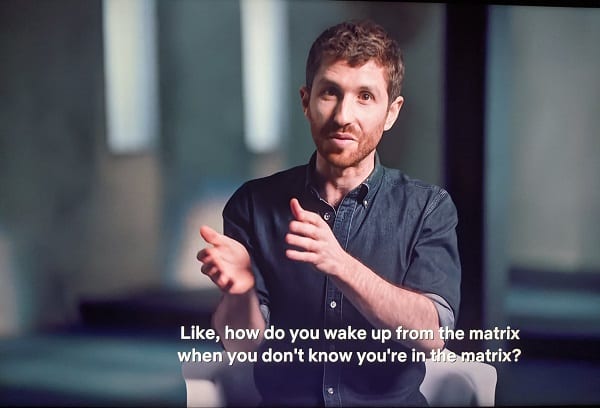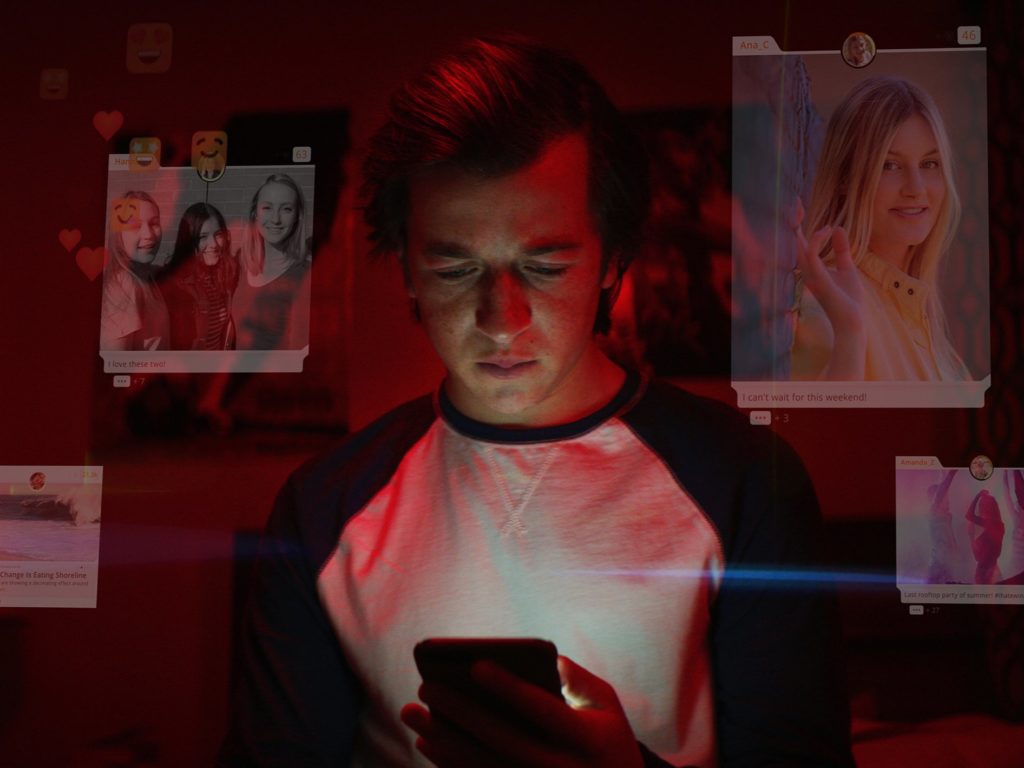Houston, we have a problem! That problem is Social Media and Big Tech. In this documentary, some of the great minds in the tech industry shed some light and raise the alarm on the risks and problems caused by social media.
For the first time, I decided to review a cultural artifact that isn’t a book because I think it deserves its attention and consideration. The Social Dilemma is a documentary available on Netflix about the problems caused by social media and Big Tech and their negative impact on our society. It is a timely and scary reminder of the downside and risks of having a population glued to their screens.
The problems we have with social media, the tech industry, and its business model are grave. They will have a disproportionate effect on our future as a society and the future of work. If we want to have a more humane future of work, this is a problem we need to address. The Social Dilemma is an excellent place to start to understand the problem in its entirety.
This is a project directed by Jeff Orlowski and promoted by Tristan Harris and the Centre of Humane Technology. It casts a who’s who of the tech industry, with interviews of Tim Kendall -ex-Facebook executive, ex-Pinterest President, Moment CEO-, Jaron Lanier -founder of Virtual Reality-, Roger McNamee -early Facebook investor- or Justin Rosenstein -former Facebook and Google engineer, creator of the “Like” button, and Asana co-founder-; and known authors like Shoshana Zuboff -Harvard Business School, author of “The Age of Surveillance Capitalism” -, Cathy O’Neil -data scientist and author of “Weapons of Math Destruction” -, or Jonathan Haidt -social psychologist, author of The Happiness Hypothesis-, just to name a few.
Apart from these interviews, it also shows plenty of footage from news and other documentaries, and there is also a fictionalized story of a family with three teenage kids and the impact social media has on them.
The result is sobering. The creators of this documentary wanted it to be a call for action, a wake-up call for a society that is distracted, misinformed, and polarized by the streams and notifications on their devices.
What’s wrong with social media?
Mmm… where to start?
The first minutes of the documentary show some of the participants seemingly unable to respond to this question. They seem not to know where to start. There are many problems with social media and the tech industry, but it’s difficult to pinpoint the source or identify the main contributor.
The main problem is the business model itself. The consumers in this model are the advertisers, and social media companies are selling their users. As the well-known phrase goes: “if you’re not paying for the product, you are the product.”
Jaron Lanier puts it differently:
“It’s the gradual, slight, imperceptible change in your own behaviour and perception that is the product”
We have become used to having all this content on the internet for free, and there is no coming back from it. Still, the perverse consequence of this is that all social media are competing for our attention, they want us to spend more time staring at our screens, and they are using all the tricks in their armoury to win.
On one side, we have our brain, evolved slowly over thousands of years; on the other side, we have the smartest engineers, psychologists, and millions of computers with access to thousands of historical data points about our tastes, likes, and past behaviour. Who is going to win this uneven fight? It’s like going to a gunfight with a knife. There is no match, and we are on the losing side.
Everything you do on the internet is constantly watched, monitored, and recorded. Tech companies are building models of predictions of what you will do next, what video will get you hooked on Youtube, what new post will keep you scrolling down in Facebook, Instagram or Twitter, etc. The company that builds the best predictive model wins. And all this is mainly done by AI, with almost no human supervision.
Tristan Harris makes a parallelism between a bicycle and social media. They are both supposed to be tools or technologies at our service, but unlike bikes, social media is not a tool waiting to be used when you need it. It’s seducing, manipulating, and addicting you, so you use it more and more.

Jaron Lanier makes another useful comparison. He asks the viewers to imagine how they would feel if Wikipedia gave each viewer different information based on their tastes, political views, or someone else’s commercial interests. That’s easy to imagine because Facebook, YouTube, or Google are already doing it! The streams differ per user; even if you search for a word in Google, the results will be different based on your past browsing history, location, and other factors.
But are social media really that powerful in manipulating us? In his essay How to Destroy Surveillance Capitalism, Cory Doctorow argues that social media would like their consumers (advertising companies) to believe that they are all-powerful and can make us buy their products by sheer manipulation, but that this isn’t really true. They are better at targeting ads by population segments, of course, but we are still not buying their products much more for it. We only click a small fraction of online ads and an even smaller fraction leads to a purchase. Doctorow believes the problem with Big Tech is their monopolistic instinct, not their manipulative tricks.
Where is all this going?
The documentary explains some of the consequences of the use of social media in our lives. An evident one is polarization and misinformation. Misinformation is extremely efficient in keeping people online, as we consume more news that outrages us than those that do not elicit a strong response from us. It makes commercial sense for media to sell outrageous stories. And then foreign powers like Russia are using the tools provided by Western companies like Facebook to destabilise Western democracies.
As Harris says, “fake news in Twitter spreads six times faster than real news. It’s a disinformation-for-profit business model.”
Social media also has a considerable impact on the mental wellbeing of people, especially the youngest ones. As Gen Z is the first generation with constant access to social media during their pre-teen and teenage years, we are now seeing a clear impact on their mental wellbeing. As Haidt mentions in the documentary, teenage girls’ admission to hospitals for self-harm and suicide rates skyrocketed after 2010. Teenagers, especially girls, seem to be measuring their self-worth by the number of likes they receive from strangers on social media. This doesn’t sound to me like a good recipe for fulfillment, happiness, and acceptance of oneself.
- “There are only two industries that call their customers users: illegal drugs and software” – Edward Tufte
Social media are continually sending stimuli to the brain, like a slot machine, to release dopamine. There is a course at Stanford University that teaches Persuasive Technology, and it focuses on keeping users’ eyeballs fixed at their screens by using psychological tricks. The consequences are addiction, manipulation, and mental health issues.
When Kendall is asked the question, “where is all this going?”, his response is, “in the short term, civil war.” Others believe there is a real existential risk for the normal functioning of democracies the world over, and something has to be done about it.
It is rather telling that social media executives themselves don’t use so much social media and considerably limit or prohibit their children’s screen time.
We have only been immersed in a society with the widespread use of social media for a decade, and its consequences in terms of polarization and misinformation have been considerable. If this continues unchecked, we are going towards a dysfunctional society where there is no common ground or shared understanding of what constitutes truth. Everybody will have their own individual truth, based on what their social media feed them. A democracy cannot function like this.
What now?
We don’t necessarily have to get there.
Social media is a problem created by humans, and humans can solve it. Cathy O’Neil says that Silicon Valley types think they can solve the problem with more technology and more AI, but she doesn’t think the solution will come from them.
The US Congress has started investigating the issue. Some of the hearings are portraited in the documentary, but the report from the House Democrats was published last week, and it is quite damming. It criticises the monopolistic instincts of Big Tech and proposes some measures to break those monopolies.
The MIT Technology Review draws on the parallelisms between Big Tobacco and Big Tech, as both industries sell an addictive product that can be harmful to their consumers. It seems companies like Facebook got their inspiration from tobacco companies for some of their commercial techniques and business model. Governments may get inspiration from the same industry for how to limit the damage and harm to users.

This could be a start, but I’m not sure government regulation alone will be able to solve the problem. The problem seems to have its roots in the business model and the incentives these companies have to keep us all hooked, staring at our screens.
The solution will come when we are able to change those incentives and when people realise they are being manipulated. We need to realise what is happening to us, and this documentary is the first step. Its goal is to raise awareness and to make us realise we have a problem. That message is loud and clear.
We do have a problem, and we need to do something about it.
Watch the documentary, please, and then like it, share it, twit it… using social media, of course.
